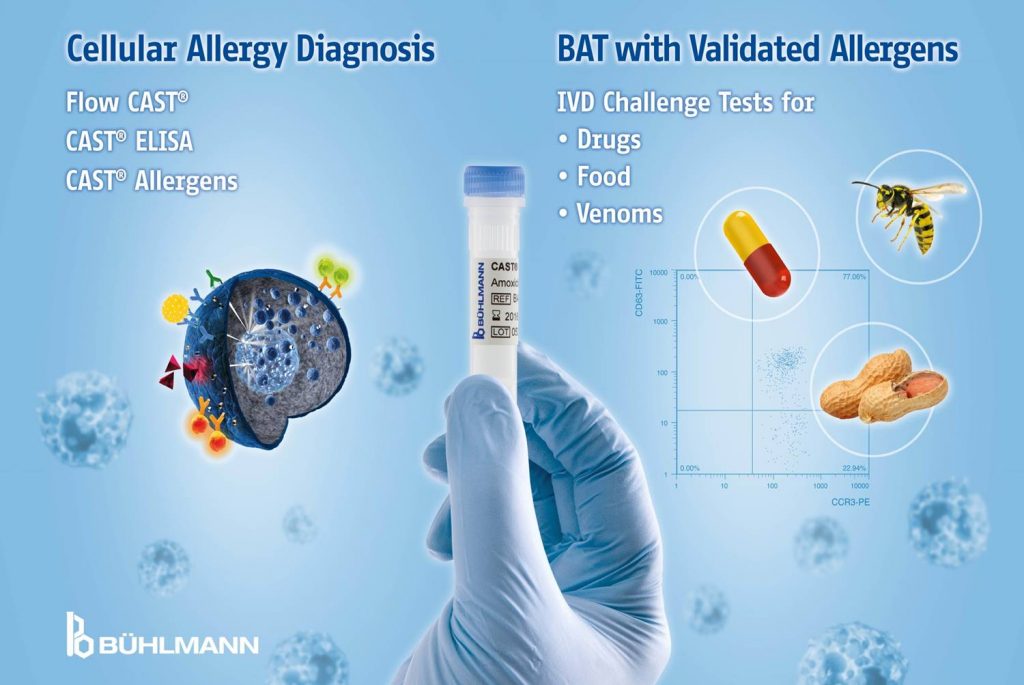We are delighted to announce the launch of the Flow CAST® Basophil Activation Test as a fully registered IVDR product, marking a significant step forward in allergy diagnostics. This news post presents an in-depth overview of the Flow CAST® Basophil Activation Test, its significance in the field of allergy testing, and the steps taken to ensure compliance with the IVDR guidelines.
Introduction
Understanding Allergies and Diagnostic Needs
Allergies are a prevalent and growing health concern globally, impacting millions of individuals. Accurate and timely diagnosis is crucial to effective management and treatment. Conventional allergy testing methods, including in vivo skin prick testing and the assessment of allergen specific IgE antibodies through blood tests, frequently yield inconclusive results. In some cases, in vivo provocation tests, which involve controlled allergen exposure and carry inherent patient risks, become necessary for allergy confirmation or diagnosis. The Flow CAST® Basophil Activation Test addresses these challenges by providing a more dependable and informative diagnostic approach.
The Role of Basophil Activation Testing
Basophils are a type of white blood cell involved in allergic responses. Monitoring basophil activation provides insights into a patient’s specific allergic sensitivities, helping clinicians identify allergens triggering adverse reactions. This information is vital for creating tailored treatment plans and enhancing patient outcomes.
The Flow CAST® Basophil Activation Test
Methodology and Principles
The Flow CAST® Basophil Activation Test involves exposing a patient’s blood sample to a panel of allergens. Through flow cytometry, the activation status of basophils is analyzed based on the expression of activation markers. This quantitative and standardized approach enables accurate assessment of allergic sensitivities.
The activation of basophils in response to allergen exposure in the laboratory setting mimics the cellular responses that occur during an actual allergic reaction in the body, providing valuable diagnostic information without the need for in vivo (in the body) challenges.
Advantages over Traditional Allergy Testing
Compared to skin prick tests and traditional IgE antibody assays, the Flow CAST® test offers several advantages:
-
- Precision: Detailed measurement of basophil activation provides specific allergen information.
- Reliability: Reduced variability leads to more consistent and reproducible results.
- Comprehensive: Simultaneously tests multiple allergens for a comprehensive profile.
- Objective: Minimizes subjective interpretation, enhancing diagnostic accuracy.
Clinical Significance and Applications
The Flow CAST® test finds applications in various clinical scenarios:
-
- Diagnosis: Identifying allergens responsible for allergic reactions.
- Risk Assessment: Evaluating sensitization levels to guide treatment strategies.
- Treatment Monitoring: Tracking patient response to allergen-specific therapies.
About the Author

Michele Romano, PhD
Michele Romano, PhD, is responsible at BÜHLMANN for the Product Management of the CAST® Assays for Basophil Activation Tests (BAT) in the field of in vitro allergy diagnosis as well as in the promising new application of drug candidate potency and efficacy testing.
He received his PhD degree in Cellular and Molecular Biology and Pathology at University of Verona, Italy and a degree in Industrial Biotechnology at University of Milano, Italy. He has joined BÜHLMANN in 2011, after a research career in the immunology field both in Industry and Academia, with the main focus in functional bioassay development and immune receptor characterization.
IVDR Compliance and Regulatory Considerations
Overview of the In Vitro Diagnostic Regulation
The IVDR framework emphasizes patient safety, diagnostic accuracy, and rigorous evaluation of medical devices. Compliance ensures that devices meet high standards and undergo thorough assessment before entering the market. Our Flow CAST® test adheres to IVDR requirements, promoting patient well-being and diagnostic reliability.
Steps Taken to Ensure IVDR Compliance
- Clinical Performance Evaluation: Rigorous testing on diverse patient populations to assess sensitivity, specificity, and predictive values.
- Technical Documentation: Comprehensive documentation of device specifications, performance data, and risk management strategies.
- Quality Management System: Implementation of quality control measures and continuous improvement processes.
- Post-Market Surveillance: Monitoring device performance and addressing any emerging concerns promptly.
Benefits and Impacts
Enhanced Precision and Reliability
The Flow CAST® test approach minimizes variability, leading to consistent and reliable results. Clinicians can confidently diagnose allergies and tailor treatment plans based on accurate information.
Improved Patient Care and Management
By identifying specific allergens triggering reactions, healthcare providers can design personalized treatment approaches, minimizing unnecessary medication use and improving patient quality of life.
Clinician and Laboratory Advantages
Clinicians benefit from objective data, enabling informed decision-making. Laboratories profit from streamlined workflows and reduced result discrepancies, enhancing overall efficiency.
Enhanced Cell Stability
The improved Flow CAST® version, featuring a cell stabilization reagent, extends the sample collection window by 5 days, improving daily workflow flexibility in the flow lab for technicians.
Future Directions and Collaborations
Ongoing Research and Development Initiatives
We remain committed to advancing allergy diagnostics through ongoing research. This includes expanding allergen panels, refining testing methodologies, and exploring new applications of the Flow CAST®.
Collaboration Opportunities with Healthcare Providers
We invite healthcare institutions to partner with us in refining and enhancing allergy diagnostics. Collaborative efforts can lead to optimized testing protocols and improved patient outcomes.
Potential Integration into Allergy Treatment Strategies
As our understanding of allergies deepens, the Flow CAST® Test has the potential to play a pivotal role in guiding allergen-specific treatment strategies, contributing to more effective and targeted interventions.
Conclusion
The Flow CAST® Basophil Activation Test represents a significant advancement in allergy diagnostics, aligning seamlessly with the IVDR guidelines. By combining precision, reliability, and compliance, this innovative test empowers clinicians to make informed decisions, enhances patient care, and paves the way for the future of allergy diagnosis and treatment.
Resources
To gain a comprehensive understanding of the Flow CAST® Test kit, we highly recommend a thorough review of the product’s Instructions for Use (IFU) available here.
To discover the potential of Flow CAST® in important diagnostic areas such as drug, food, and Hymenoptera allergy, we suggest exploring our comprehensive IVDR-certified CAST® allergen portfolio.
Publications
We can provide an extensive list of publications that showcase the clinical performance and utility of the test upon request. In this section, we are sharing significant posters containing data and themes resulting from the comprehensive assay revalidation, which were presented at notable allergy congresses.
- EAACI2022 Praha. Poster: Higher Basophil Activation Test Performance Flexibility by Prolonged Assay Read-Out of Fixed Cells. (link)
This poster addresses two critical challenges in BAT testing:
1. It demonstrates the stability of basophils in a blood sample, making reliable BAT testing possible for up to 48 hours. This affordability aligns with modern sample logistics.
2. It highlights the improved stability of processed basophils achieved by the new Flow CAST®, allowing sample acquisition for up to 5 days.
- EAACI2023 Hamburg. Poster: Analytical and Stability Validation Studies for Basophil Activation Test according to IVDR. (link)
This poster presents the key findings from the IVDR validation of the assay, focusing on aspects such as blood and specimen stability, robustness, precision, and reproducibility. These findings demonstrate the assay’s compliance with the new and demanding regulatory requirements
- EAACI2023 Hamburg. Poster: Experimental and Theoretical Approaches to Understand the Technical Cut-off in Basophil Activation Test. (link)
In this poster, we provide a summary of our reference interval study, in which we establish a technical cut-off for the assay at 5% of CD63 positive basophils. Additionally, we demonstrate that our rate of IgE non-responders is notably lower than the 5%-10% published rate. Furthermore, we introduce an experimental approach to define the minimum number of basophils required for acquisition.
For more information about the Flow CAST® and its IVDR compliance, please contact us


Social Links